WISATA ALAM KELABBA MADJA
Kelabba Madja menjadi wisata unggulan Sabu Raijua saat ini, Kelabba Madja menjadi pemenang pada ajang Anugerah Pesona Indonesia (API) 2018 untuk kategori surga tersembunyi terpopuler
Kelabba Madja menjadi wisata unggulan Sabu Raijua saat ini, Kelabba Madja menjadi pemenang pada ajang Anugerah Pesona Indonesia (API) 2018 untuk kategori surga tersembunyi terpopuler
Festival Teater, Seni Budaya dan Bahasa Festival ini merupakan kegiatan dalam menggali bakat & kreativitas siswa siswi SMA/SMK Se-Kabupaten Sabu Raijua dalam memainkan peran yang diceritakan dalam cerita rakyat.
Warna dominan pada tenun Sabu adalah biru tua (nila/indigo), merah (akar mengkudu), dan putih (warna alami benang kapas). Bagi masyarakat Sabu, kain adalah identitas yang dimaknai layaknya tubuh
Pelaksanaan ritual minta hujan yang di lakukan para Mone Ama wilayah Adat Hawumahara sesuai kalender adat Hawumahara
Kegiatan Padoa Masal diselenggarakan Oleh Dinas Pariwisata dan Kebudayaan Kabupaten Sabu Raijua melampaui target 2500-3000 orang
Savu is located in the Lesser Sundas of eastern Indonesia (Nusa Tenggara Timur) half way between Sumba and Timor. The Savu archipelago includes Savu, Raijua and Dana and gave its name to the sea bordering Flores, Timor and Sumba. The Savu archipelago is part of the Savu Sea Marine National Park, whose aim is the protection and conservation of all types of marine mammals such as whales, dolphins, dugongs and turtles.
The Climate is dry for most part of the year. The rainy season from December to March brings irregular, but heavy rain and its share of floods near the coasts. Due to the scarcity of water the island produces few agricultural goods. It does allow one harvest of corn, mung beans, sorghum, tubers (cassava, taro), and cucurbitaceae (gourds, pumpkin, cucumber). Wet rice is restricted to the fewareas of the island which can be irrigated.
During the six to nine months of the dry season all river beds are dry and water supply is a main concern in the archipelago. The dry season is known here asawe menganga (musim lapar, B.I.), the hungry season. The sap the lontar palm tree provides an essential source of nutrition
Savu has numerous white sandy beaches, protected by reefs. Some beaches played a role in history like the beach between the harbour of Seba and the walled village of Bodo; it served as a landing place for Captain James Cook and his crew in 1770.
The beach of Uba Ae in Mesara hosts the most important ceremony of the year, kowa hole, where a ceremonial boat is launched out to sea.
Uba Ae in Mesara, as well as beaches of Raijua, is visited by surfers.
Gathering of sea food on reefs, small scale fishing activities, gathering of sea salt, sea weeds farming. Sea salt gathering using large shells or lontar containers has been a traditional activity on Savu and Raijua. In the last fifteen years seaweed farming has developed along the west and southeast coasts, bringing a new source of revenue to those living near the beaches.
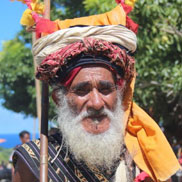
Sabu Raijua memiliki Objek Wisata Alam yang mempesona yang terletak di beberapa titikdestinasi salah satunya adalah Wisata alam Kelabba Madja Di Kec. Hawu Mehara
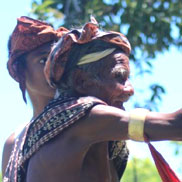
Wisata Bahari Sabu Raijua memiliki karateristik Pantai dengan pasir berwarna putih
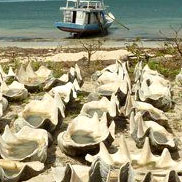
Sabu Raijua memiliki obyek wisata budaya yang unik dan menarik seperti perkampungan adat megalitik, dan ritual adat yang dapat menarik perhatian wisatawan baik domestik maupun manc ...
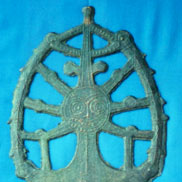
The megaliths of Savu are natural wonders. They are not burial places, but physical time markers. They were dragged to ritual places from various parts of the island.
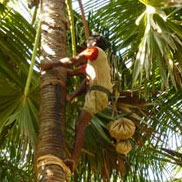
Each domain of Savu has its own ritual calendar (kalender adat or kew�hu rai, the knots of the land) as well as a specific number for calculating the day of a ritual in the lunar ...
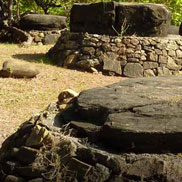
A village of origin or rae kepue is (or was) fenced, has a number of houses of the type èmu rukoko, a ritual place and sacred stones

Ceremonies of the adat calendar are linked to the traditional religion Jingi tiu. They are held for the well-being of the population, for connecting people with their ancestors
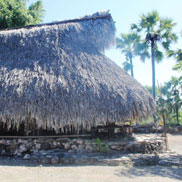
Traditional houses on Savu bear witness to a rich historical and cultural legacy. Today they still can be seen in all parts of the island, fulfilling their purpose as identity mark ...
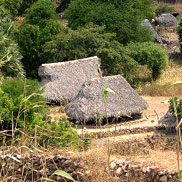
The lontar palm tree has been for centuries the tree of life for the Savunese who drink its sap during the dry season. Every part of the tree is used in everyday life and for cerem ...